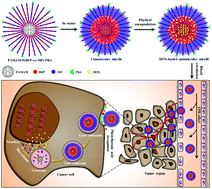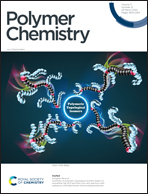Phenylboronic acid-functionalized unimolecular micelles based on a star polyphosphoester random copolymer for tumor-targeted drug delivery†
Abstract
To overcome the thermodynamic instability of polymeric micelles in an extremely high dilution bio-environment, unimolecular micelles with covalently-bound molecular architectures have been widely studied for drug delivery. In this work, an amphiphilic multi-arm star random copolymer, polyamidoamine-poly(butenyl phospholane-co-methoxy phospholane) with phenylboronic acid end groups (abbreviated as PAMAM-P(BEP-co-MP)-PBA), was synthesized by a simple one-pot ring-opening polymerization with the fourth-generation PAMAM dendrimer as a macro-initiator. Then, unimolecular micelles (UMs) were formed by the obtained copolymers in a dilute aqueous solution. Dynamic light scattering (DLS) and transmission electron microscopy (TEM) results showed that the UMs possess uniform spherical structures and stable hydrodynamic sizes (ca. 20 nm). Besides, further information on polymer repeat unit numbers could be theoretically calculated by comparison of hydrodynamic sizes and contour lengths. Doxorubicin (DOX) could be encapsulated into the inner hydrophobic regions of the UMs. The obtained DOX-loaded UMs exhibited a slow and sustainable release behavior in an intracellular simulated environment. Furthermore, in vitro cytotoxicity and cellular uptake studies demonstrated that the DOX-loaded UMs could specifically recognize and accumulate in HepG2 cells, and then inhibit tumor cell growth effectively. Therefore, this PBA-functionalized unimolecular micelle could be a promising candidate for targeted drug delivery.



 Please wait while we load your content...
Please wait while we load your content...